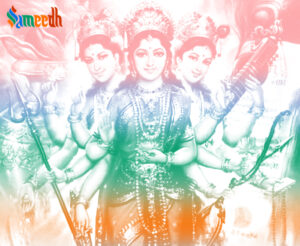Shaktism is a major tradition within Hinduism that focuses on the worship of Shakti, the divine feminine energy or power, often personified as the Goddess. Shakti is considered the primordial cosmic energy that pervades the universe and is responsible for creation, preservation, and destruction.

Shaktism emphasizes the worship of the Goddess in various forms and manifestations, each representing different aspects of her power and divine attributes. Shaktism centers around the worship of various forms of the Goddess, including Durga, Kali, Parvati, Lakshmi, Saraswati, and many others. Each goddess represents different aspects of Shakti, such as strength, compassion, wisdom, abundance, and creativity.
Key aspects of Shaktism include:
- Shakti and Shiv: Shaktism often emphasizes the inseparable relationship between Shakti (the Goddess) and Shiv (the god of destruction and transformation). They are often depicted as a divine couple, with Shakti as the dynamic creative force and Shiv as the passive consciousness. Their union symbolizes the cosmic balance between masculine and feminine energies.
- Tantric Practices: Tantra, a spiritual and ritualistic tradition, plays a significant role in Shaktism. Tantric practices involve the use of rituals, meditation, mantras, yantras (sacred diagrams), and mudras (gestures) to harness and channel divine energy for spiritual growth and enlightenment.
- Yoni and Lingam Worship: Shaktism incorporates the worship of the yoni (symbolizing the divine feminine) and the lingam (symbolizing the divine masculine). These symbols represent the union of Shakti and Shiv and are revered as sacred symbols of creation and regeneration.
- Shakti Peethas: Shaktism recognizes certain pilgrimage sites known as Shakti Peethas, which are believed to be the locations where parts of the Goddess’s body fell after her self-sacrifice to save the universe from destruction. These sites are considered highly sacred by devotees of Shakti.
- Festivals and Rituals: Shaktism celebrates various festivals dedicated to the Goddess throughout the year, such as Navaratri (nine nights festival), Durga Puja, Kali Puja, and Diwali. These festivals involve elaborate rituals, prayers, fasting, and devotional practices to honor and invoke the blessings of the Goddess.
Shaktism encompasses a diverse range of beliefs, practices, and traditions, with variations across different regions and sects. It emphasizes the divine feminine aspect of the divine and celebrates the power of creation, nurturing, and transformation embodied by the Goddess. Shaktism holds profound spiritual significance for millions of devotees worldwide and continues to be a vibrant and influential tradition within Hinduism.